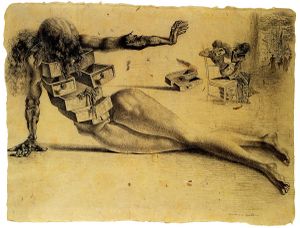Contemporary Literature of the Body, Spring 2002: Difference between revisions
(Updated image.) |
m (Tweaked cats.) |
||
| Line 94: | Line 94: | ||
* Exam 3 | * Exam 3 | ||
[[Category:USF]] | [[Category:USF]] | ||
[[Category:Spring 2002]] | [[Category:Spring 2002]] | ||
[[Category:F2F]] | |||
Latest revision as of 08:27, 20 July 2020
| LIT 3073 | R 6:00–8:50pm | CPR-202 | USF Spring 2002 |
|---|
In recent years, the human body has been rethought by science, philosophy, and art. Postmodernist views no longer see the body as something “natural,” instead viewing it as a place of intersection between various forms of cultural discourse, like media, medicine, morals, materialism. This course will examine the body as a cultural artifact produced by language, how the ideals of our society are written on and through the body, and the body’s changing boundaries precipitated through emerging technologies. Many of the texts we will examine in this class contain explicit sexual material and/or strong language and/or violence. Please be advised.
Materials
- Ballard, J.G. Crash.
- Burgess, Anthony. A Clockwork Orange.
- DeLillo, Don. The Body Artist.
- Dick, Phillip K. Do Androids Dream of Electric Sheep.
- Morrison, Toni. The Bluest Eye.
- Rucker, Rudy. Software.
- Course Book of Stories and Essays from Gray’s College Bookstore by Petsmart and Target
Requirements
Exams: 70%
Two in-class and one out-of-class exams will be given as the major evaluative element of this course. These exams will test your knowledge of the subject matter, your ability to synthesize this material, and your creativity in going beyond the discussion and lecture materials. Exams will include vocabulary, identification, and interpretation. All exam grades will be based upon thoroughness, depth of insight, precision, and originality. All three exams will constitute 70% of your final grade, and will be open-book.
Class Participation: 30%
Regular class attendance and active participation in classroom discussion and the class interchanges are required. Some assignments will occasionally count for participation: quizzes, peer editing, the viewing of a film, and similar activities. Additional assistance may be obtained from me during my office hours or by appointment. Your participation in group activities both in-class and at a distance will be weighed heavily in evaluation. Since writing is an on-going process, participation, effort, and attitude will count as much as written work.
For every assigned reading, a quiz should be expected. These quizzes are designed to test factual aspects of the text, not interpretation or evaluation. Read every text carefully and take reading notes — character names, general plot, important items, etc. — and the quizzes will be no problem. Quizzes, other class activities, and homework assignments not explicitly outlined on this document will be factored into your final class participation grade.
Schedule
This schedule represents the ideal outline for our study this semester. Yet, like all best-laid plans, we will probably not be able to keep up with our agenda. Please be flexible and try to look and read ahead whenever possible. We will do our best to stick by this schedule, but we will inform you verbally and update this schedule whenever there is a change in or an addition to an assignment. Getting these updates is solely your responsibility. Therefore, this syllabus is tentative and subject to change contingent upon the needs of the students and the professor, and dictated by time and other constraints which may affect the course. This syllabus reflects only an overview of the assigned reading and other major course assignments. It does not always indicate other specific class session assignments or activities.
Week 1: Jan 10, 2002
- Course Introduction
- Contemporary Literature: what’s all that about?
- The Body: Our First Medium
- Film: Christopher Nolan’s Momento
02: 01.17.02
- Campbell “Who Goes There”
- Cortazar “Axolotl”
- Di Filippo “Big Eater” and “Little Worker”
- Kundera “The Hitchiking Game”
03: 01.24.02
- Burgess A Clockwork Orange
04: 01.31.02
- Bear “Blood Music”
- Rampo “The Human Chair”
- Walker “The Abortion”
05: 02.07.02
- DeLillo The Body Artist
06: 02.14.02
- Exam 1: Take home. Due no later than 12:00pm, Friday, Feb 15th. Submit a hard copy to the secretary in the English Department (CPR 348), or email an attachment (in RTF).
07: 02.21.02
- Coover “The Babysitter”
- Sterling “Deep Eddy” and “The Bicycle Repairman”
08: 02.28.02
- Ballard Crash
- Viewing: Cronenberg Crash
09: 03.07.02
- Ballard Crash (cont.)
- Bataille Introduction to Erotism: Death and Sensuality
- Article assignment: pick an article from a scholarly journal or book (this will require you to actually go to the library) that addresses Ballard’s Crash. Read the article and be ready to talk about the critic’s main points in class.
10: 03.14.02
- Spring Break, No Class
11: 03.21.02
- Exam 2
12: 03.28.02
- Morrison The Bluest Eye
13: 04.04.02
- Begin: Dick Do Androids Dream of Electric Sheep?
- Viewing: Scott Blade Runner
14: 04.11.02
- Continue: Dick Do Androids Dream of Electric Sheep?
- Homework Due: Find one article addressing Dick’s Androids, and one addressing Scott’s Blade Runner respectively. Read them and write a one-page synthesis of both articles. Be ready to discuss your findings in-class.
15: 04.18.02
- Di Filippo “One Night in Television City”
- Ellison “I Have No Mouth, and I Must Scream”
- Tiptree “The Girl Who Was Plugged In”
- Gibson “The Gernsback Continuum” and “Johnny Mnemonic”
16: 04.25.01
- Exam 3
